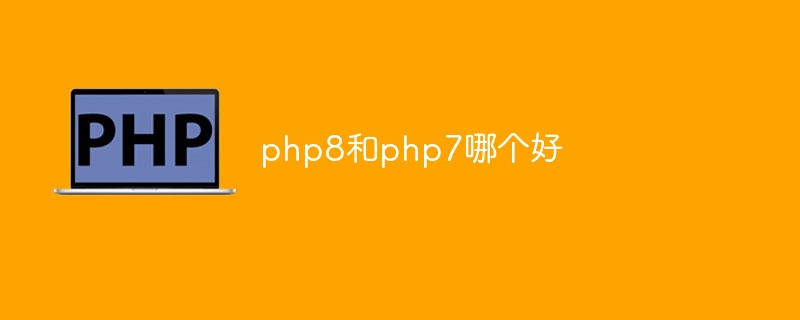
Compared with PHP7, PHP8 has some advantages and improvements in terms of performance, new features and syntax improvements, type system, error handling and extensions. However, choosing which version to use depends on your specific needs and project circumstances. Detailed introduction: 1. Performance improvement, PHP8 introduces the Just-in-Time (JIT) compiler, which can improve the execution speed of the code; 2. New features and syntax improvements, PHP8 supports the declaration of named parameters and optional parameters, making functions Calling is more flexible; anonymous classes, type declarations of properties, etc. are introduced.

The operating system of this tutorial: windows10 system, php8.1.3 version, DELL G3 computer.
PHP8 and PHP7 are both versions of the PHP programming language, and there are some differences and improvements between them. Below I will compare PHP8 and PHP7 from several aspects to help you understand their advantages and features.
1. Performance improvement:
PHP8 has made many optimizations in terms of performance. Compared with PHP7, PHP8 has better performance. PHP8 introduces the Just-in-Time (JIT) compiler, which can improve the execution speed of the code. In addition, PHP8 also made some improvements to the internal implementation of the language to improve memory management and execution efficiency.
2. New features and syntax improvements:
PHP8 introduces many new features and syntax improvements, making programming more convenient and efficient. For example, PHP8 supports the declaration of named parameters and optional parameters, making function calls more flexible; it introduces features such as anonymous classes, attribute type declarations, and static return types, which enhance the capabilities of object-oriented programming; there are also some new built-in functions and syntactic sugar, making code writing more concise and readable.
3. Type system improvements:
PHP8 has improved the type system and introduced static type checking and type inference. Through type annotations and declarations, type errors and potential problems can be discovered during the coding phase, improving the reliability and maintainability of the code. PHP8 also introduced Union types and Mixed types, adding support for complex types.
4. Error handling and exception handling improvements:
PHP8 has improved error handling and exception handling. PHP8 introduces a new error handling mechanism, which converts some operations that would otherwise cause fatal errors into exceptions, so that these errors can be better handled and captured. In addition, PHP8 also introduces a new exception class FiberError for handling coroutine-related errors.
5. Extensions and compatibility:
PHP8 has updated and improved some extensions to provide better functionality and performance. At the same time, PHP8 also adds deprecation warnings for some outdated and deprecated features, encouraging developers to write code in a more modern and secure way. This may require modification and adaptation of some old code to ensure compatibility with PHP8.
To sum up, PHP8 has some advantages and improvements compared to PHP7 in terms of performance, new features and syntax improvements, type system, error handling and extensions. However, choosing which version to use depends on your specific needs and project circumstances. If your project requires better performance and more new features, then PHP8 is a good choice. If your project is already running well on PHP7 and does not have high requirements for performance and new features, then it is okay to continue using PHP7. The most important thing is to make a choice based on your own needs and circumstances, and make reasonable use of various versions and features of PHP to improve development efficiency and code quality.
The above is the detailed content of Which one is better, php8 or php7?. For more information, please follow other related articles on the PHP Chinese website!
 How is the performance of php8?
How is the performance of php8? What is the difference between php5 and php7
What is the difference between php5 and php7 Is the speed of php8.0 improved?
Is the speed of php8.0 improved? What is the difference between php7 and php8
What is the difference between php7 and php8 html web page production
html web page production How to clean the C drive when it turns red
How to clean the C drive when it turns red What is the difference between 4g and 5g mobile phones?
What is the difference between 4g and 5g mobile phones? What are the commonly used functions of informix?
What are the commonly used functions of informix?